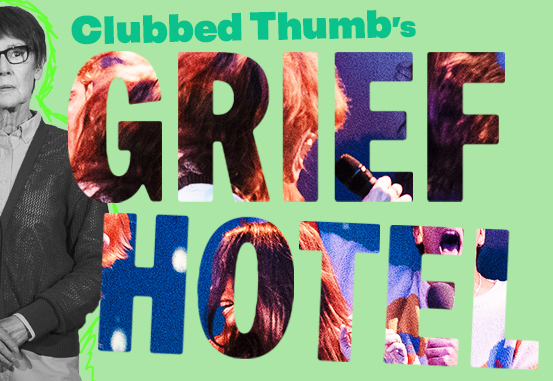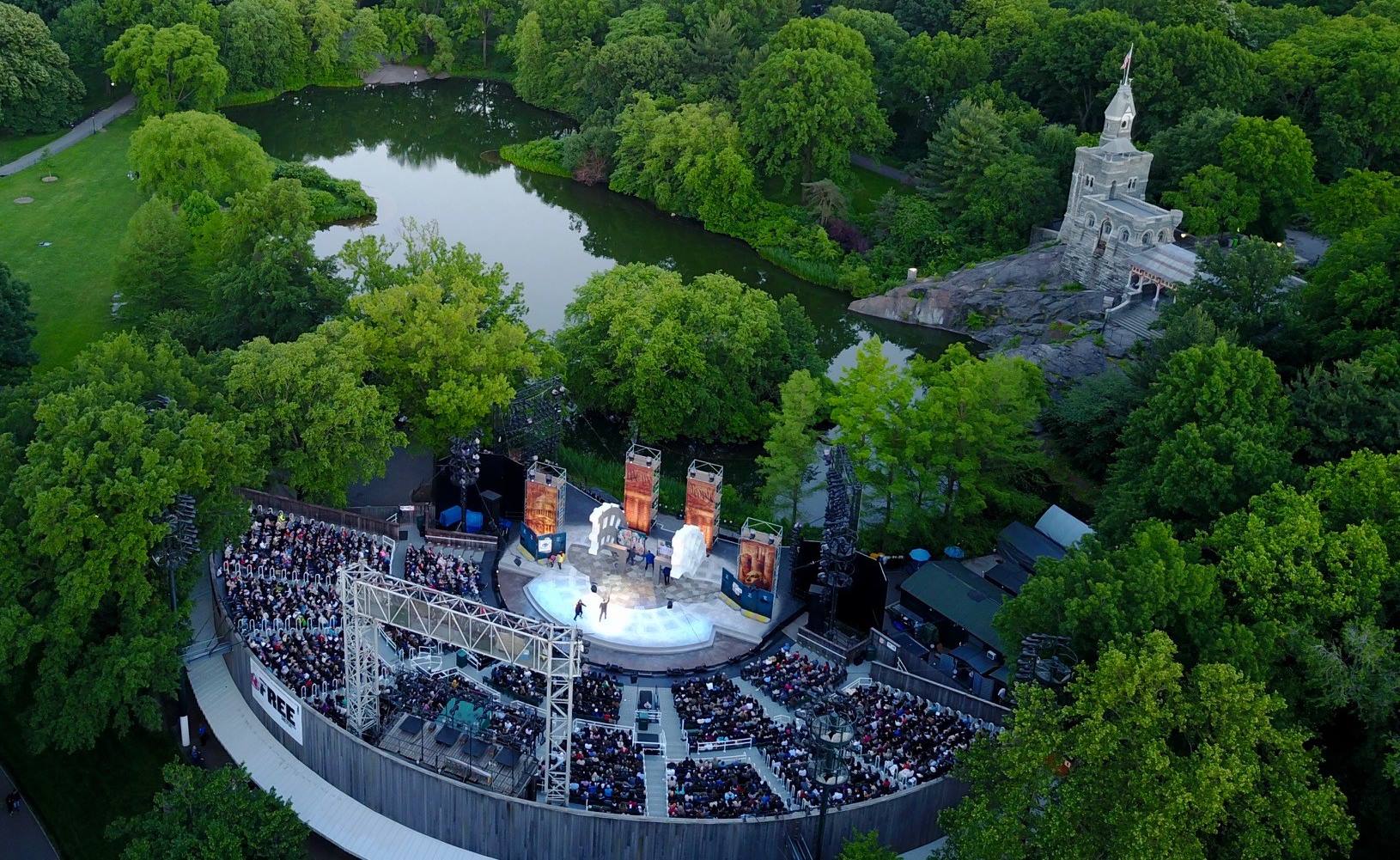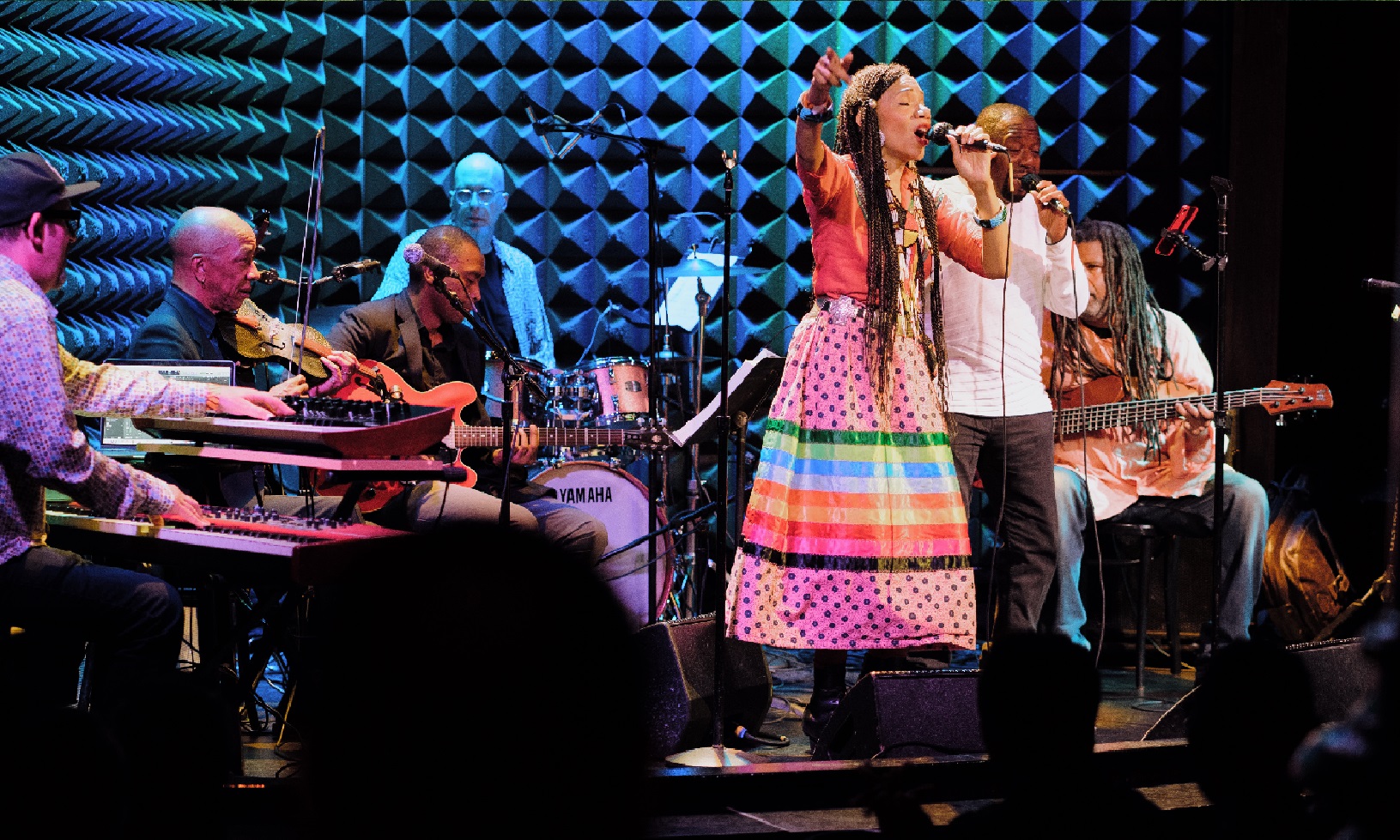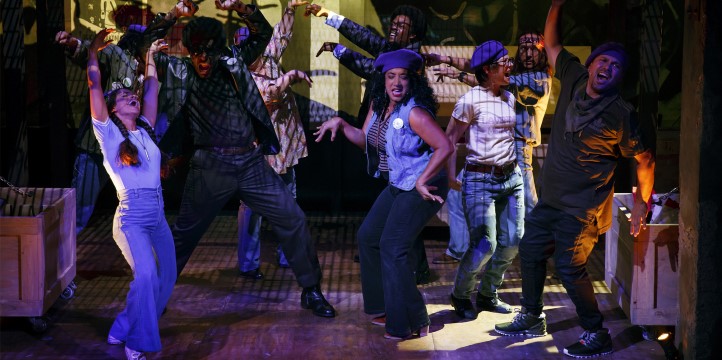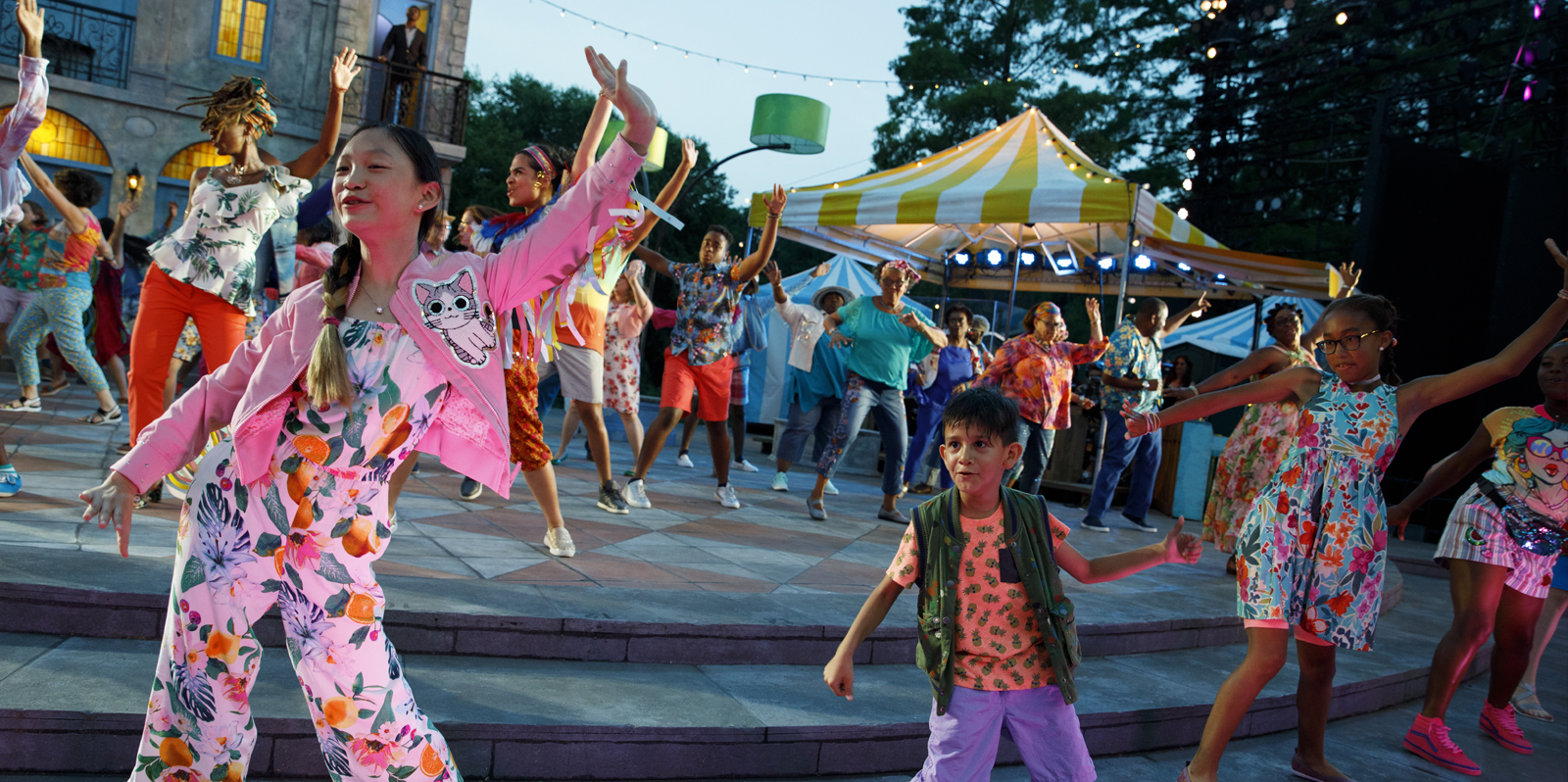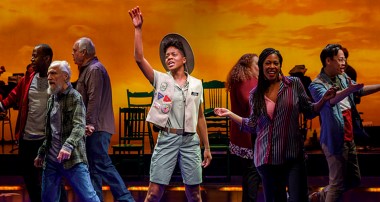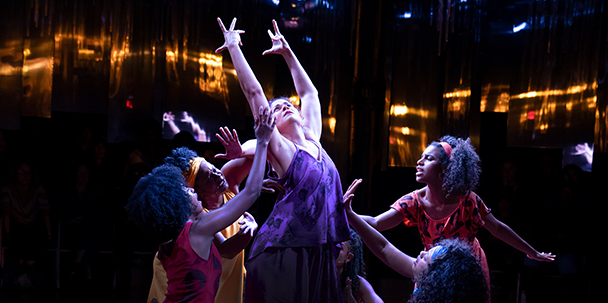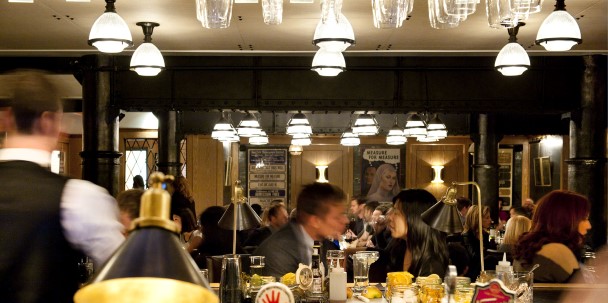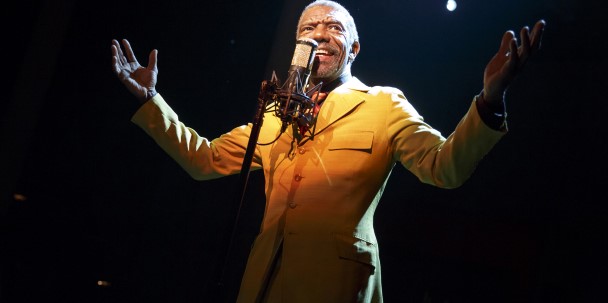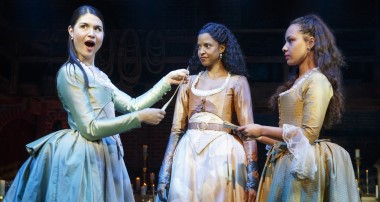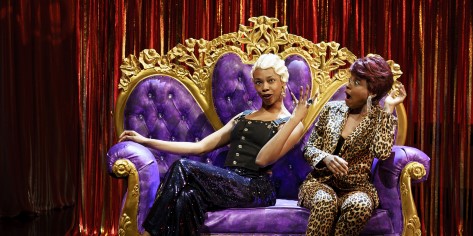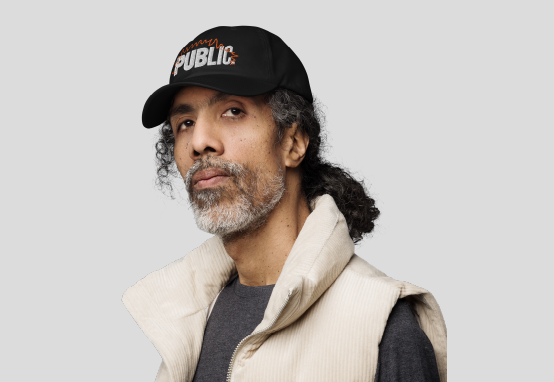Fernando Masterson: In 1954, a man named Joe Papp decided to bring free performances of Shakespeare to the people of New York. He toured the parks across the city, eventually ending up in Central Park and on Aster Place.
Reynaldi Lindner Lolong: But that was just the beginning. What began as summertime Shakespeare in neighborhood parks has since blossomed into a year-round hub of culture, featuring new plays and musicals, live music, international performance art, cabaret, community dialogue, civic engagement, and of course, Shakespeare.
FM: Through it all, the impulse has remained the same: to be a theater that is of, by, and for all people. Welcome to Public Square, a podcast of The Public Theater.
FM: Hey, Reynaldi.
RLL: Hey, Fern. Are we just gonna begin every single one—?
FM: This is how we’re gonna start every single one.
[laughter]
FM: Hey, Reynaldi.
RLL: Hey, Fern.
FM: Heyyyy. So we’re here.
RLL: Yeah. It is, fall is in full swing.
FM: Fall is here.
RLL: It’s cold. I’m actually wearing a sweater for the first time since May and I’m very resentful about that.
FM: It is cold; we are very cold, and full of fear, because Halloween is now over. So I guess we wouldn’t be full of fear.
RLL: Thus making it November 1st, and we have—
[laughter]
FM: That’s what—that’s what makes it November.
RLL: And we have just announced the sweet sixteen anniversary Under the Radar Festival.
FM: Sweet sixteen … there will be feather boas, and probably a really nice car outside, but it’s not the car I wanted.
RLL: What was the car that you wanted?
FM: I don’t know, a G-Wagon. [laughs]
RLL: Fern’s really been pushing this Under the Radar sweet sixteen idea.
FM: I love, sorry, that’s what it is. I’ve been watching a lot of MTV and I’ve been working on Under the Radar, so that’s all that we can talk about! And actually, that’s what we’re talking about this episode, right?
RLL: Yeah, we will be talking with Mark Russell, the Artistic Director of Under the Radar Festival, and, just so you all know, no joke, Under the Radar is my absolute favorite thing that we do.
FM: Reynaldi’s a super-fan, and I think we go into details about it but you, like, hold the record for one of the most, like, attendee—you know, number of performances attended for Under the Radar. Is that correct, or am I wrong?
RLL: Almost. So we have the staff challenge—there are about 15-20 shows in Under the Radar every year, and we have a staff challenge whereby if you see every single show in the festival, Mark Russell will get you a bottle of whiskey, and I’ve done this for five years in a row. It is not easy, ‘cause a lot of these shows schedule on top of each other. Um, my favorite story that I like to tell is I was missing one show because it was sold out, and it was at the USS Intrepid, and so at 10:00 p.m., I found myself jaywalking across the West Side Highway to get in the standby line for a show at the USS Intrepid in a blizzard, and then I had to run back to The Public to see a show at the Martinson on the third floor, and then I went to Joe’s Pub for a midnight show.
FM: [laughs incredulously]
RLL: These are the things I will do for the Under the Radar Festival.
FM: We keep things fun and fresh. And actually, for a lot of—maybe a lot of folks don’t know this, but the Under the Radar Festival is all over New York City; it’s not just packed inside the home of The Public Theater, which makes getting that bottle of whiskey even harder, because you have to travel across the city, or end up in Brooklyn somehow, I don’t know, five seconds later. Who knows? But you do it somehow.
RLL: Exactly. Once I ended up in somebody’s living room off the G train. There were three of us in the audience; it was literally a living room. The show was amazing, so it was worth it.
FM: There we go. Reynaldi has a Time-Turner; that’s what we’ve learned. Anyway, we’re going to be sitting down with Mark Russell, talking about a few other things, and I think that it’s going to be super fun and super spooky.
FM: Hi, Mark!
MR: Hello.
FM: How’s it going? You wanna tell us your name and what you do?
MR: Sure. I’m Mark Russell; I’m the Artistic Director of the Under the Radar Festival.
FM: Ooooooh.
MR: Yeah.
FM: It’s—it’s been years. We’ve had sixteen years of Under the Radars. How do you keep things fresh and edgy, year after year?
MR: Um, that is a really tough, uh, number for me, to be completely fresh and edgy each year, and I seem to be getting older and all the artists stay the same age, around the twenties and thirties; it’s kind of funny that way. But I have spies now around the world, I’ve been doing this a long, long time, and—before you were born, probably—and so, people tell me what to do. And also, what—Under the Radar’s meant to be sort of a lens on the scene, so I am waiting for what the artists in the field internationally are doing, and you’ll find it in waves.
Like a lot of people are suddenly working with communities and real people, and just like some of our Public Works things, and in different ways. So someone like Lola Arias, who was in last year’s Festival, comes out of that movement, and does it in an amazing way that I felt the U.S. needed to see. It’s a little bit of a dialogue with the U.S. artists, and it’s like, “You should see what this is,” and there’s a lot of intimate theatre that does not get over the seas, you know, it can’t play BAM; it doesn’t make fiscal sense. And we have intimate theaters here, and we can use them, and there’s this—this kind of theatre connects to audiences, into communities, in a really visceral straight-on level. You feel like, I am actually hearing from someone who is dealing with their problems in France, or whatever. And on the other side, programmers and everyone comes over here to see what American artists are doing.
FM: Hmm.
MR: And what are—how are they responding? Now, theatre’s a very slow form, and theatre’s usually the last one to really get to address—I mean, I think in maybe in five, ten years we’ll see the right Trump event.
FM: Mhm.
MR: But it does—they do vibrate with what’s going on in the field, and—and you just never know how that’s going to come out. So I don’t work with a theme. I just, I try to listen, I have of course my own Geiger counter, so like, what do I feel is right? And I—and then I throw my dice, and we’ve got quite a few coming this year.
FM: Really excited about it. And I love what you’d said about how it, you know, Under the Radar does kind of shrink the world in a way, where you’re kind of getting a taste of so many different countries and all this eclectic art that you wouldn’t normally see, and at a great accessible price, so.
MR: This is a more international year than most, right now.
FM: And so, that was actually my next question. So let’s talk about this next season.
MR: Yeah.
FM: Okay, I mean, what’s different about it, and what are the highlights? What are you looking forward to? You know, what—what’s the special sauce this season?
MR: Yeah. Well, you know, I told you—I just told you I don’t work with themes.
FM: Yes?
MR: Actually, this year, there’s almost a thread going through this festival.
FM: Mm, okay.
MR: And so a group like, coming from Australia, the Back to Back Theatre, is actually, uhh, a neurologically diverse group, and they are doing a piece called The Shadow Whose Prey the Hunter Becomes, which is sort of like a town meeting that goes really south. And they’re great; they’ve been with us a couple times.
FM: I was gonna say, a few years ago.
MR: Yeah. Ganesh Versus the Third Reich was one of the favorite things that was ever in Under the Radar.
FM: That’s exciting, and I’ve been waiting—for those of you who don’t know, I’m working on the marketing for the show, so Mark and I have had to look at all the assets, and they look amazing! So, that one’s exciting. Uh, some of the other shows coming up, what are like, some big highlights that you’re looking forward to?
MR: I am really looking forward to Ahamefule J. Oluo’s Susan. Now, a couple years ago, Ahame did a piece called Now I’m Fine, which is about, kind of comes from a phone call he had with his Nigerian dad who he had never really spent time with or met, and um, it—it threw him into kind of a physical and emotional crisis. Um, this one is about his hippie mom, Susan, who raised him, and it’s, um—Ahame is a comedian, a raconteur, a trumpet player, and a composer, and this is all done with a jazz orchestra. It’s amazing music. Ahame is really well-known in the Seattle scene, plays around with Macklemore and other people like that, so, I’m really looking forward—I think this is a future star.
FM: I love it. He’s a triple threat.
MR: Yeah.
FM: No pun intended.
RLL: Is it—is it the same kind of, like, onstage big band backing the story?
MR: Yeah, it’s more of a jazz band this time—
RLL: Okay.
MR: —not a big band, but it’s—he’s so—
RLL: It looks very cool.
MR: There’s a few less people coming. But, it’s big, it’s big.
FM: Watch the trailer; I’m pretty sure it’s him with the music, right?
MR: It’s going to be great. Yeah.
FM: That’s awesome. So, um, we’ve got—you’ve got a few other shows coming up, and then, um, Reynaldi and I had kind of had this conversation about soft power, um—
RLL: Yeah, so it’s interesting, um, you know we have Soft Power onstage right now, and actually last month we talked to Jeanine Tesori and David Henry Hwang—
FM [at the same time]: So great.
RLL: —and, you know, they also comment on how, like, it’s very rare, first of all, that theatre can respond to issues and the world quickly, particularly musical theatre.
MR: Yeah.
RLL: And it’s interesting to just kind of see you make that kind of same statement with the work that you look at and try to curate.
MR: Yep.
RLL: But it also got us thinking, you know soft power is all about, like, what is the cultural export of a country and how that affects your perception of that country, and so I’d be curious to hear, like, as you see all these different pieces and stories from other countries, has that at all just affected your perception of either America or the world, or just like, our place in global conversation?
MR: Yes. I mean, it’s always eye-opening to be over there and kind of be looking back at the U.S. And sitting with people, drinking coffee with people, who are having a different perception of what is going on, and the questions they ask you, and the—uh, the work that they put together; you know, there’s a lot of work that I see over there that’s all about the identity of the EU and the rise of the right in the EU, or there’s a lot of work, uhhh, that I saw in Edinburgh this year about Brexit, you know, or, or— And it wasn’t necessarily specifically about Brexit; it was about the feeling, as I feel these shows will be, of the—of this sort of general fear of chaos that’s coming, and—and what that does to the personality of the artist and the world and—and what comes out.
["A Hit Of You" plays]
RLL: That was “Hit of You” by Rizo, one of the artists performing at Joe’s Pub as part of this year’s Under the Radar Festival. You can check out the full festival lineup at publictheater.org/utr20.
RLL: Let’s talk a little bit about the Incoming! series, you know, kind of ushering this new generation of theatre-makers that are kind of trying to operate in the same way—and what’s that process been like? Because I feel like a lot of that work is very much in response to the time.
MR: Yes. Yes. Um, well you know, The Public Theater was a home for Richard Foreman and for the Mabou Mines and all sorts of people— Des McAnuff and Joe Chaikin. All these people were working and sort of, Joe gave them a home, gave them a roof and productions and resources, and Oskar and I came up during that time, and so we wanted—I think he wanted to continue that legacy, and that’s where Under the Radar fits in, and this is looking at that next generation, or trying to use the resources that The Public Theater has to help this work survive and come about.
RLL: One of my favorite stories about UTR is Belarus Free Theatre, 2011.
MR: Yes.
RLL: And, so as I understand it, you know, there was a lot of just civic unrest right as they were leaving and the group had to do a lot of just kind of geographic leapfrogging to get here.
MR: Mhmm.
RLL: And I think that really just speaks to what it means for some of these groups to have a platform here, and what it means for some of these groups to tell a story that they literally will get killed for telling anywhere else.
MR: Yep.
RLL: And I would love—just love to hear just how—how that affects your perception of working with artists, of what it takes to tell a story, knowing that, at least right now in this country, that’s not the case. For now.
MR: Well, I mean we still have a little bit of free speech left, you’re talking about?
RLL: Exactly.
MR: It’s ah, it’s inte—I mean, to work with the Belarus Free Theatre, which was really an underground theater—they would arrest the audience if they found them performing—and then they, uh, in 2010, there was this election, there were riots, they were caught in those riots and jailed over Christmas, and then there was this big snowstorm and my staff pulled them out of hiding and out of the country by safehouses and by like, hiding in blankets in cars, like driving all the way to Moscow; we rerouted them out of Moscow to get them here.
FM: Wow.
MR: And it was an amazing experience. And then the—the work that they brought, which was Being Harold Pinter, was just—you just won’t see those Pinter plays that way again. They’re really a great company. And, yeah, that’s a landmark event for us. Now we don’t have anything quite that way, but there was an artist, there’s an artist in Incoming!, and we wanted her to do this piece called Disclaimer, and it’s from Piehole, and she had to check with her friends—she’s Iranian; it’s about her Iranian family—she had to check with her friends to make sure she wasn’t going to get in trouble, because she like, needs to go back to visit her family, and if word comes out that she’s criticizing the regime, it’s very possible she could be banned from going back, or they could hassle her family back in Iran. So, every once in a while it comes right into your face, and you go, well, I’m—we’re living pretty loose here. So far. But, and these—these things we take so for granted are actually really delicate, and I think we just are feeling that so much more right now.
FM: Well I’ll say, I think Under the Radar gives artists this space to kind of, to criticize and to explore and to be, you know—I mean, it’s got, the festival has a lot of grit and edge to it, and I think that is on—that is on you, Mark. I mean, you have done an incredible job curating this festival over the years, so, kudos.
MR: Wow. I mean you know, that’s—that’s my taste, is grit and edge. So, um, I’m attracted to things that have a certain authenticity to them and seem to be speaking to their time, and so—but it really is, it comes from the artist and that’s the deal; that’s why we work so damn hard, is that like, you meet an artist that is actually telling a story like Aleshea Harris, this piece What to Send Up When it Goes Down, um, amazing, and we are going hell to high water to get this in. We didn’t have a theater for it that would have worked for this piece, so we are doing it actually on the stage of a theater, that’s actually our largest theater, but we’re only having sixty people in it. [laughs] So it’s, um—I’m really proud of that, and—and that is, Aleshea is part of a movement of African American writers, especially African American female writers, writing about issues like Black Lives Matter and the black body. This is kind of a ritualized piece and it has vibrations like Fairview, Jackie Sibblies Drury's Fairview. It’s um—I’m really excited it’s here and that we are able to make it happen.
FM: Well, I think that we are excited, not only for the Festival, but we’re just excited to have the opportunity to talk to you.
MR: It’s great to talk to you guys, and we don’t do it enough.
RLL: We are here with Christyn Budzyna, Web Developer here at The Public Theater. We kind of think of this as that meme that’s “What do you tell people you do? What do people think you do? And what do you actually do?” And we’re really excited to talk with you because web development at a theater is such an interesting, just, collision of careers.
CB: Yeah! I mean, most theatre organizations don’t have web developers, so it’s really interesting to work at a theatre organization that does have web developers on staff. So I think—so, what I do, in a nutshell, or the “tell a fifth grader” version of what you do, is I work on the website, I make sure that people can buy tickets, I make sure that people can access the information that they need. Um, what people think I do sometimes is update the copy that’s on the website or the pictures that are on the website, and that’s actually more in Marketing’s department. What we do is we create the designs and the templates for Marketing and other teams around the organization to go in and—and really fill out with that content. So, um, you know, we’re building new features, new functionality for the website all the time; you know, the Public Theater’s always doing crazy new shows and we’re building all the functionality to support that—those new productions.
RLL: And what originally got you started in web development as a career?
CB: Sure, so, I actually—I come from a theatre background originally. I’ve been a big theatre nerd forever, I was a theatre major in college, I write lyrics for musicals now, so I actually started on the theatre side of things and then came to web development later. So this job is like a really nice cross-section of those two passions. Um, when I came out of college I worked for the The New York Musical Festival for a couple of years; I started in their literary department, so I was in a completely different world. And then after that I worked at a tech startup for a couple of years, where I got really interested in the tech side of things, and I did this program called Dev Bootcamp that was web development intensive, and that’s where I learned all about how to code. And then, when I graduated, I—it was just so lucky that The Public Theater was looking for a web developer. I was like, oh man! This is a perfect position for me! It’s like, a perfect intersection of the two things I love.
RLL: What is it about coding and web development that you find—that like, gets you so excited to work on?
CB: Yeah, so, I think part of it is the fact that I’ve always loved puzzles, crossword puzzles, and like, lyric writing and writing code is really similar in that they’re sort of figuring out a puzzle, putting, like, tinkering with little things until they work. And the other half of it is I really like the design side of it, so I really like styling things, making things look pretty, move around pixels. So, uh, it’s kind of those two things together.
RLL: I love that combination of—I love that you were able to kind of create that connection between lyric writing as puzzle and coding as puzzle, because now you’re making me wonder if today, as like a day job, would Sondheim have been a web developer?
CB: Maybe.
[laughter]
CB: He was really into crossword puzzles, so I can—yeah.
RLL [overlapping]: That too, that too.
CB: So I feel like, yeah, he’d probably be a really good web developer, I bet.
RLL: What advice would you give to someone who might be listening and not really realize that they could have a career in web development and working in theatre? Like, advice to get started, or how they can go about learning.
CB: Yeah, I mean, I think that it’s super helpful to have both; I think it was great coming into The Public Theater, to have a working knowledge of just how theatre works and how theatre organizations are run. So, having that knowledge, and then, just learn as much as you can about coding. There are programs like the program I did, Dev Bootcamp, there are web developments bootcamps where you can learn—and they’re basically intensive programs where you go in and you do nothing but code for ten, eleven hours a day, which is intense but it’s great, and you learn a ton. So, you know, there is a path to doing something super technical but also being part of an arts organization.
RLL: Christyn, thank you so much for joining us, and I also want to—just really want to give a shoutout to Christyn and our other web developer Peter, completely redesigned our website, so if you are looking at The Public Theater’s website, that is entirely their work from scratch. They are an amazing team to work with, and we are incredibly lucky to have you both.
CB: Thanks so much, Reynaldi.
FM: I love, love love love, that Christyn ended, or well, was talking about the kind of like, Sondheim-esque puzzle master versus artist kind of dichotomy, and how to be one you must be both. True that. And actually, Constellations’s coming up, and Nick Payne does a lot of that in his work. I know we have Constellations coming up in the Festival—another Festival plug.
RLL: Is that the one you’re most excited for?
FM: I think it is. And only because there is, I don’t know if it’s a hamster or a gerbil, but there is a hamster or a gerbil in the show and it is running on a little wheel the whole time. I don’t know if this is—it’s not a spoiler; you see it in the trailer, and it’s the first thing, so it’s not a spoiler. But it’s um, it’s done in Chinese and Mandarin Chinese at La MaMa, and the hamster is meant to play God.
RLL: That’s deep.
FM: Yeah. [laughs]
RLL: The hamster is God. Wow. I think I am most excited for—I’m really excited to see Ryan Haddad’s Joe’s Pub cabaret.
FM: Oooooh.
RLL: ‘Cause he is an artist I originally saw as his Incoming! show, and then he has done work with EWG, and now just like to see—it’s so fascinating to see an artist literally graduate from a Incoming! artist, up through playwright, to performing on the Joe’s Pub stage.
FM: And, I mean, even on The Delacorte in Queer & Now this last season.
RLL: Yeah.
FM: And, a little plug for The Politician on Netflix—
RLL: Yes.
FM: He’s on the first episode! I I loved the first episode, he—
RLL: And he was a guest on our second episode of the podcast. There’s a lot of love for Ryan on Public Square.
FM [overlapping]: He was also on the podcast and it was great. Oh my gosh, so we’ve like, got a lot of famous people on our podcast. Who will be next?
RLL: Our next guests are actually going to be—we’re going on the production side route. We will be talking to veteran Stage Manager Buzz Cohen—
FM: Buzz Cohen is a celebrity at The Public Theater.
RLL: Yes, she is. She has stage managed more that seventy shows with The Public, but she is going to be in conversation with Alyssa Howard, who is Production Stage Manager on For Colored Girls…, and this is Alyssa’s first Public Theater stage management show, and we are going to have an amazing conversation between these two generations of amazing stage managers about just what it means to be in that line of work and to work in the theatre as a stage manager.
FM: I cannot wait, you cannot wait, and—thank you guys.
RLL: We’ll see you in December.
Special thanks to Mark Russell, Christyn Budzyna, and Drew Broussard, as well as Katie Hodge and John Zeitoun. The featured song was “Hit of You” by Rizo, and the music in this episode is by Michael Friedman.

